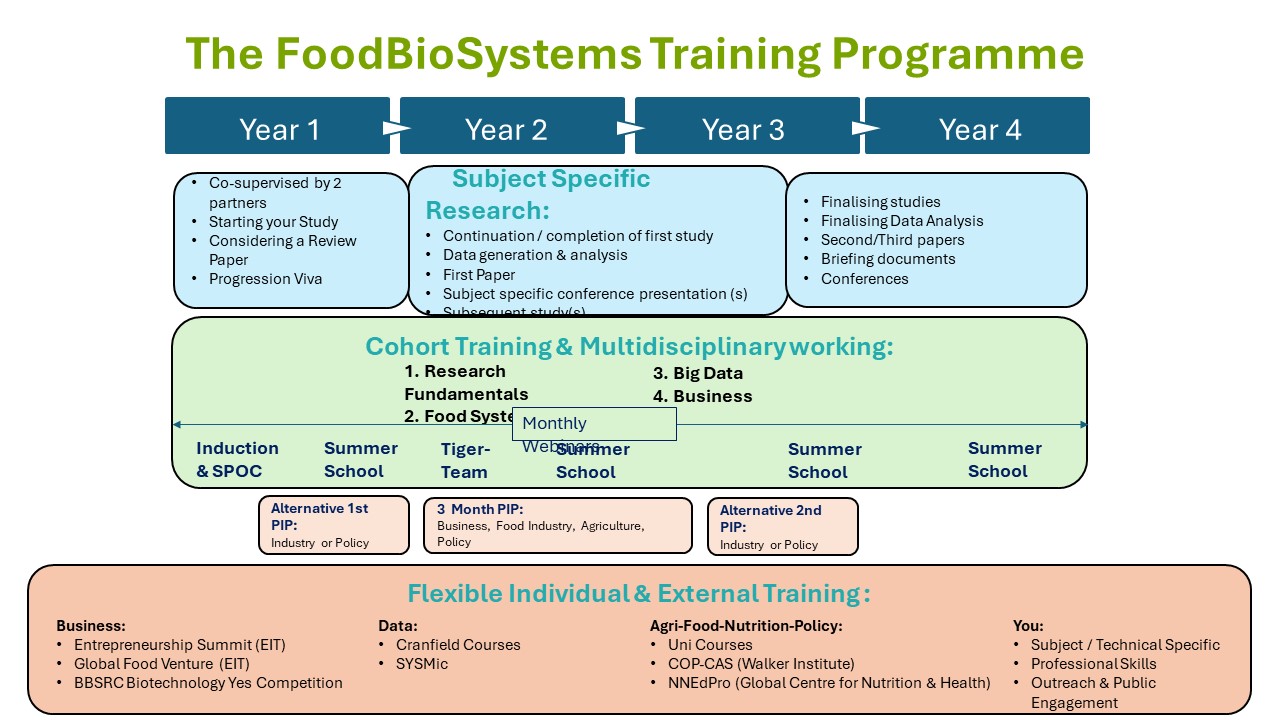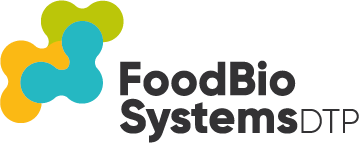Training
FoodBioSystems offers a wider range of excellent and innovative training in skills that equip researchers across the agri-food-nutrition chain. Our doctoral researchers each undertake a 4-year PhD programme co-supervised across two universities within our DTP consortium, enabling students the best access to state-of-the-art facilities and providing the very best individual technical and subject specific training.
There are 3 layers of the training journey – individual training, cohort level training and external training; tailored to individual needs and career goals. Cohort training covers four key themes: Food Systems, Big Data (data analytics and modelling), Business, and Research Fundamentals.

How we deliver our training
Induction: During term one, each FoodBioSystems students takes part in cohort induction: four weekly online one-two hour sessions and an online one-day workshop.
Annual summer school: Our students meet at one of our partner universities, for a week each year, during summer school. During the first three days, all students participate in training sessions based around either one of our four key themes or on career development. Summer school ends with a two-day conference where all students have the opportunity to present their work to peers and academic staff.
Online and in-person training during the academic year: Throughout their projects, our students also participate a combination of on-line and in-person training. This might be core training in one of our four key themes or could be flexible training according to individuals’ needs.
Monthly webinars: provide a forum for our students and supervisors to discuss their research. Webinars are planned and hosted by a committee of volunteers from all host universities who organise each 90 minute session with a guest academic speaker and presentations by DTP students.
Professional Internships for PhD Students (PIPS): All students who are engaged in a standard studentship project (no commercial partner involvement) complete a three month PIPS (usually in their 2nd or 3rd year). PIPS offer the opportunity to work outside of an academic research environment and to explore transferable skills in a different context. This is a great way to boost employability skills and explore career options. Our current students have undertaken placements in areas such as policy, grants management, science communication and outreach and in start-up companies. Students who are engaged in a project with an industrial partner (CASE studentship) must complete a three month placement with the project partner but can also opt to undertake a PIPS.
Key training themes
Food systems
Food systems training is delivered though on-line module Introduction to the Food System (delivered by our partner EIT-Food), participatory activity workshops and summer school project work with our partners the Walker Institute and IFSTAL (Interdisciplinary Food Systems Teaching and Learning). This includes exploration of food systems and positioning our research activities, investigation of food systems thinking, intervention for food systems change, building resilience, and foresight and scenario analysis.
Brunel University delivers a training session during summer school on introduction to life cycle analysis.
Big data (data analytics and modelling)
All DTP students are encouraged to take part in our Introduction to data science and Machine learning: three-day residential courses designed by staff at Cranfield University specifically for our students. Other opportunities such as SysMIC or BBSRC/MRC DataCamp are available for students who want to develop their skills further.
Business and entrepreneurship
All students participate in Tiger Teams during their second or third year. They work in interdisciplinary inter-university teams to solve real problems or challenges proposed by collaborative partners. The teams work for about 12 days over three months to develop and test solutions for the problem they have been set then present their solutions. This is a great opportunity for teams develop their skills in delivering to a deadline and presenting their work professionally.
Training in entrepreneurship and impact during induction is followed by opportunities to participate in the YES competition or to join the Global Food Venture programme (EIT Food).
Research fundamentals
Training during induction and summer school covers research skills: research integrity and ethics, critical evaluation, data management at induction to support DRs as they develop their in-depth subject training through research.
Flexible training
We also offer opportunities for our students to undertake training that suits their individual interests or research needs
Career development workshops at summer school explore diverse career options and support career planning
Nutrition training delivered by our partner NNedPro (Global Institute for Food, Nutrition and Health). This includes achieving a Foundation Certificate in Applied Human Nutrition, accessing their International Summit on Nutrition and Health, and training in Interdisciplinary Transformational Leadership in Education and Research.
Exploration of the food-climate intersection: FoodBioSystems students have opportunities to engage as official observers in United Nations Framework Convention on Climate Change (UNFCCC) meetings (COP) focusing on resilience in the agri-food sector. Previous DRs have attended COP in-person or been based at the Climate Action Studio (COPCAS) in Reading. They have interviewed key stakeholders and published influential blogs about these experiences.

